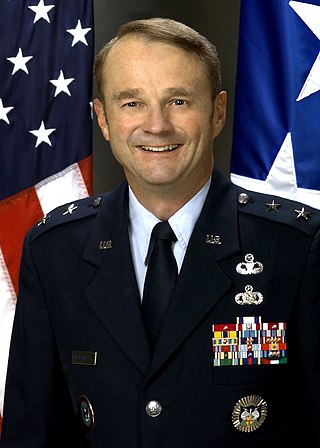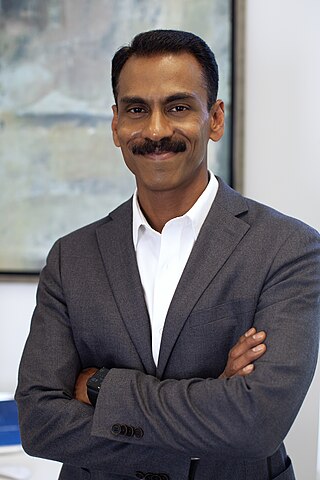Chief information officer (CIO), chief digital information officer (CDIO) or information technology (IT) director, is a job title commonly given to the most senior executive in an enterprise who works with information technology and computer systems, in order to support enterprise goals.
A management information system (MIS) is an information system used for decision-making, and for the coordination, control, analysis, and visualization of information in an organization. The study of the management information systems involves people, processes and technology in an organizational context. In other words, it serves, as the functions of controlling, planning, decision making in the management level setting.
A chief technology officer (CTO) is an officer tasked with managing technical operations of an organization. They oversee and supervise research and development and serve as a technical advisor to a higher executive such as a chief executive officer.
Delbert W. Yocam is an American businessman who was CEO and chairman of Borland, former president, COO and director of Tektronix and a former Apple Computer executive. At Apple, during the 1980s, Yocam ran the Apple II group and later became Apple's first chief operating officer (COO). He served on the board of directors at Adobe Systems.

Dr. Dale W. Meyerrose, Major General (Retired) was the first President-appointed, Senate-confirmed Associate Director of National Intelligence/Intelligence Community Chief Information Officer (CIO) and Information Sharing Executive for the Director of National Intelligence (DNI).

Werner Hans Peter Vogels is the chief technology officer and vice president of Amazon in charge of driving technology innovation within the company. Vogels has broad internal and external responsibilities.

Dennis E. Wisnosky is an American consultant, writer and former chief architect and chief technical officer of the US DoD Business Mission Area (BMA) within the Office of Business Transformation. He is known as one of the creators and initiators of the Integrated Definition (IDEFs) language, a standard for modeling and analysis in management and business improvement efforts.

Vivek Kundra is a former American administrator who served as the first chief information officer of the United States from March, 2009 to August, 2011 under President Barack Obama. He is currently the chief operating officer at Sprinklr, a provider of enterprise customer experience management software based in NYC. He was previously a visiting Fellow at Harvard University.

Chris C. Kemp is an American entrepreneur who, along with Dr. Adam London, founded Astra, a space technology firm based in California, in 2016. He served as the Chief Information Officer (CIO) for the NASA Ames Research Center in Mountain View, California, and as NASA's first Chief Technology Officer (CTO) for information technology. While at NASA, Kemp partnered with Google and Microsoft and helped in the creation of Google Moon and Google Mars. He worked with the White House to develop the cloud computing strategy for the United States Federal Government and co-founded OpenStack, an open-source software project for cloud computing. He was also one of the founders of Nebula, a company that from 2011 to 2015, worked to commercialise the technology.
A. Lakshman Rao is the former Chief Operating Officer of Wipro Technologies. Rao joined Wipro's Information Technology business as a founder member in 1980 and contributed significantly towards building a R&D team. From 1993 to 1996, he worked as Vice President (Technical) at Wipro Systems and played an important role in building competence in Client/Server and Object technologies. During this period, he was instrumental in building a number of business practices from scratch. Testing services, business intelligence, data warehousing and e-Enabling are some of them. As group vice president and chief technology officer of Wipro from 1996 to 1999, he implemented ISO 9000 compliant quality processes across the Software Divisions of Infotech Group. He has also driven the SEI CMM initiative enabling Wipro to become the first SEI CMM Level 5 Software Services Company in the world. In Oct 2000, Rao took over the leadership of Telecom and Internetworking Solutions Division and steered the business through multifold growth to its present prominent position.
Roger W. Baker was the assistant secretary and the chief information officer (CIO) for the Department of Veterans Affairs. He directly managed an organization of over 7,500 information technology (IT) professionals and a budget of over $4 billion. He was nominated by U.S. President Barack Obama to serve as the assistant secretary for information and technology, and was confirmed by the United States Senate on May 18, 2009.
Stephen Brobst is an American technology executive.
Stephen J. Andriole is an American information technology professional and professor at Villanova University who has designed and developed a variety of interactive computer-based systems for industry and government, from positions in academia, government and industry.

Stu Shea is an American business executive and leader and intelligence professional serving in a leadership capacity to public and private companies, as well as an advisor to government agencies, private equity investors, and academic institutions. Shea is chairman, president and chief executive officer of Peraton, a national security technology company. He is the former president and chief operating officer of Leidos, chief operating officer of Science Applications International Corporation (SAIC), and founder and emeritus chairman of the United States Geospatial Intelligence Foundation.
Kim Stevenson is an American business executive focused on managing technology businesses and driving IT digital transformation for technology brands including NetApp, Lenovo, Intel, IBM, EDS, and HPE. She currently serves on the board of directors for Ambiq Micro, Mitek Systems, Quarterhill Inc., and Verisk Analytics, Inc. as well as on the advisory board of TruU, a privately held software company.

Jeroen Tas is a Dutch entrepreneur and senior executive in the healthcare, information technology and financial services industries. In February 2017, he assumed the role as Chief Innovation & Strategy Officer at Philips Healthcare, a position he held until July 2021. He currently works on Strategic Business Development and is also a member of the executive committee at Royal Philips.
Mayank Prakash is a businessman based in the United Kingdom. Computer Weekly magazine described him as "the most influential person in UK IT" in their 2017 awards.

Jayaprakash "Jay" Vijayan is a US-based entrepreneur, engineer, inventor, and investor. He is the founder and CEO of Tekion Corp, a SaaS company based in the United States. Prior to founding Tekion, he served as chief information officer (CIO) at Tesla Motors. He also worked for VMware and Oracle.

Lisa A. Costa is an American computer scientist and defense official serving as the deputy chief of space operations for technology and logistics of the United States Space Force since 2021. She is its chief technology and innovation officer. Costa was the chief information officer of the United States Special Operations Command from 2018 to 2021.








